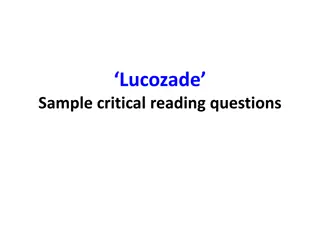
Understanding the Subjunctive Mood in Latin
Explore the various independent uses of the subjunctive mood in Latin, including its expressions of commands, potentiality, deliberation, and wishes. Gain insights into the nuances of the subjunctive mood through examples and explanations, enhancing your understanding of this essential aspect of Latin grammar.
Uploaded on | 10 Views
Download Presentation

Please find below an Image/Link to download the presentation.
The content on the website is provided AS IS for your information and personal use only. It may not be sold, licensed, or shared on other websites without obtaining consent from the author. If you encounter any issues during the download, it is possible that the publisher has removed the file from their server.
You are allowed to download the files provided on this website for personal or commercial use, subject to the condition that they are used lawfully. All files are the property of their respective owners.
The content on the website is provided AS IS for your information and personal use only. It may not be sold, licensed, or shared on other websites without obtaining consent from the author.
E N D
Presentation Transcript
Independent Uses of the Subjunctive Mood
General: Latin has three moods or manners of verbal action . The indicative mood is used for statements of fact and questions. The imperative mood expresses a command. The subjunctive is used to express idea, intent, desire, uncertainty, potentiality, or anticipation. The subjunctive is found primarily in subordinate clauses, but some independent uses also exist. Its use is subtle and best learned from long exposure to the original texts. But general rules do exist.
A. Jussive and Hortatory The Jussive (iubeo, -ere, iussi, iussus) and Hortatory (hortor, -ari, -atus sum) are used to express a command or an exhortation: Veniat! Let him come! (Jussive) Veniamus! Let s come! (Hortatory) The Jussive occurs in the third person, the Hortatory in the first. The negative is introduced by ne: Ne hoc faciat! Let him not do this!
B. Potential Subjunctive: The subjunctive may be used to express an action which might possibly occur: Haeccredas. You might believe these things. Dicaseumhominem bonumesse. You might say he is a good man. Past potentiality is expressed by the imperfect subjunctive: Credereseumhominem bonumesse. You might have believed he was a good man.
C. Deliberative Subjunctive: The present and imperfect subjunctives are used to deliberate about something, often in a rhetorical question: Quid faciam? What am I to do? Quid facerem? What was I to do? The negative is introduced by non.
D. Optative Subjunctive The Optative (opto-are) is used for a future wish capable of fulfillment, introduced by utinamor ut(negative utinamne or ne): Utinamveniat! Would that he may come! Utinamne veniat! Would that he may not come! Contrary to fact wishes use the imperfect subjunctive for present time and pluperfect subjunctive for past time: Utinamveniret! Would that he were coming (but he is not). Utinamvenisset! Would that he had come (but he did not).
"De mortuis nihil nisi bonum LET US SPEAK." diximus dicimus dicemus dicamus
"Equo NE CREDITE!" The more common prose construction Ne credas Num credere Nolite credere Non credimus
Ad claras urbes Asiae NAVIGEMUS. We are sailing We shall sail We sailed Let us sail
AGAMUS gratias deis nam nostros hostes superavimus. We give Let us give We will give We have given
Agite, omnes! EAMUS ad bibliothecam. We'll go We are going Let's go We went
Augustus tam iratus erat ut Ovidium in exsilium MITTERET. he sent he will send he must send he had sent
Catullus quaesivit quot basiationes Lesbiae SATIS ESSENT. are enough were enough have been enough will be enough
Ita durus eras ut neque amore neque precibus MOLLIRI POSSES. you are able to be softened you were able to be softened you had to be softened you could have softened
Let the games begin! Ludi incipient. Ludi incipiant. Ludi incipiunt. Ludi inceperunt
LET US REJOICE in our recent victory. Gaudeamus Gaudemus Gavisi sumus Gaudebimus
LET'S NOT WATCH so much television. non spectare nolite spectare ne spectemus non spectamus
Milites matronam rogaverunt QUO IRET. where she was going when she would go why she was going how she is going
MORIAMUR et in media arma ruamus. Let us die We are dying We must die We were dying
NE illos milites in campo TIMEAMUS. We do not fear We fear no one Let's not fear If only we had not feared
NE PSYCHE EXCITET deum dormientem. Let Psyche not awaken Psyche is not awaking If Psyche should awaken Don't awaken Psyche now
Nunc scimus QUID SIT AMOR. what love was what love had been what love is what love can be
PETAMUS pacem. Having sought We have sought Let us seek Let them seek
Prima luce LABOREMUS et post meriediem ludamus. we work we shall work work let's work
Pueri ludebant DUM mater domum rediret. as long as while until at the same time as
Quis est tam demens UT libenter ad regna Plutonis descendat? that like how lest
Utinam Icarus patri PARUISSET! was obeying should obey will obey had obeyed
UTINAM LEGISSES hos versus pulcherrimos! You should read If you read If only you had read Don't read
Utinam veritatem _____! dixeram dico dixissem dicebam
Uxor, VIVAMUSque ut viximus. we have lived we live we shall live let us live
What am I to do? Quid faciam? Quid facio? Quid feci? Quid facerem?






















